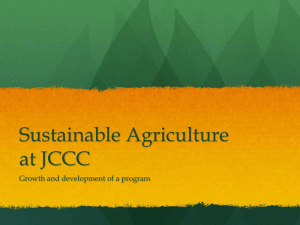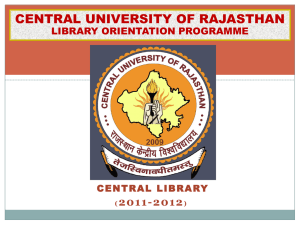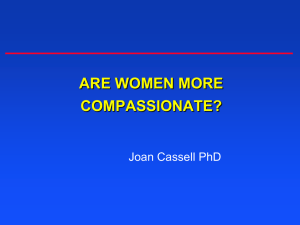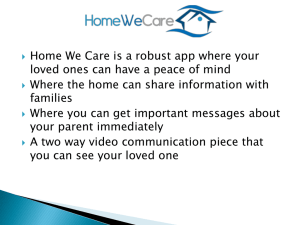Families JCCC transcript
advertisement
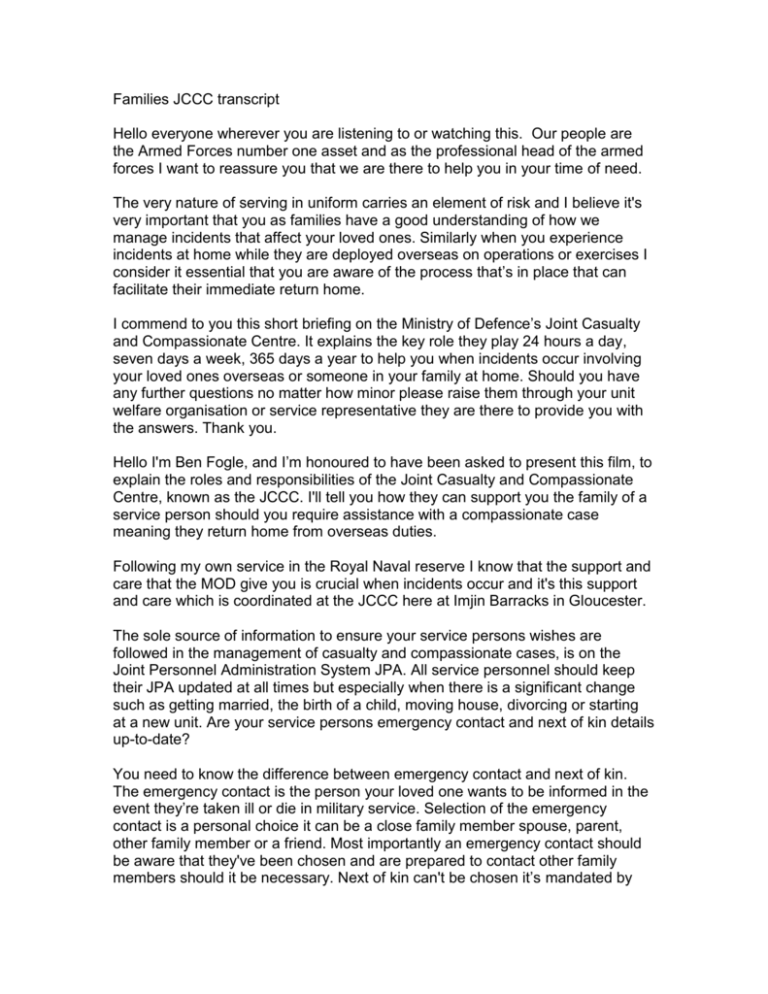
Families JCCC transcript Hello everyone wherever you are listening to or watching this. Our people are the Armed Forces number one asset and as the professional head of the armed forces I want to reassure you that we are there to help you in your time of need. The very nature of serving in uniform carries an element of risk and I believe it's very important that you as families have a good understanding of how we manage incidents that affect your loved ones. Similarly when you experience incidents at home while they are deployed overseas on operations or exercises I consider it essential that you are aware of the process that’s in place that can facilitate their immediate return home. I commend to you this short briefing on the Ministry of Defence’s Joint Casualty and Compassionate Centre. It explains the key role they play 24 hours a day, seven days a week, 365 days a year to help you when incidents occur involving your loved ones overseas or someone in your family at home. Should you have any further questions no matter how minor please raise them through your unit welfare organisation or service representative they are there to provide you with the answers. Thank you. Hello I'm Ben Fogle, and I’m honoured to have been asked to present this film, to explain the roles and responsibilities of the Joint Casualty and Compassionate Centre, known as the JCCC. I'll tell you how they can support you the family of a service person should you require assistance with a compassionate case meaning they return home from overseas duties. Following my own service in the Royal Naval reserve I know that the support and care that the MOD give you is crucial when incidents occur and it's this support and care which is coordinated at the JCCC here at Imjin Barracks in Gloucester. The sole source of information to ensure your service persons wishes are followed in the management of casualty and compassionate cases, is on the Joint Personnel Administration System JPA. All service personnel should keep their JPA updated at all times but especially when there is a significant change such as getting married, the birth of a child, moving house, divorcing or starting at a new unit. Are your service persons emergency contact and next of kin details up-to-date? You need to know the difference between emergency contact and next of kin. The emergency contact is the person your loved one wants to be informed in the event they’re taken ill or die in military service. Selection of the emergency contact is a personal choice it can be a close family member spouse, parent, other family member or a friend. Most importantly an emergency contact should be aware that they've been chosen and are prepared to contact other family members should it be necessary. Next of kin can't be chosen it’s mandated by UK law. For married personnel the next of kin is a wife or husband this is also true for personnel who are separated but not yet formally divorced. For single personnel the next of kin is the closest bloodline relative, please note that the common law partners, girlfriends and boyfriends can be chosen as emergency contacts but are not the next of kin. The JCCC will respect your loved ones wishes regarding whom they want to be told in the event of an incident their emergency contact but for the most serious casualty cases, or for those under 18 the JCCC are also obliged to tell the next of kin at the same time. Failure to update the emergency contact or next of kin details on JPA considerably hinders the JCCC on who they should be contacting at times when action needs to be taken, possibly in a life or death situation. The JPA P001 cards are issued by the unit Admin Office to be passed on to you. You can have as many as you need. You can also download the JCCC app which compliments the card and provides guidance on who to contact if an incident occurs at home. It's important that your service person writes their service number on the card or enters it into the app. So let’s cover what the JCCC do when a service person becomes a casualty. The JCCC is the single point of contact for all casualty incidents regardless of where they happen in the world. The JCCC is responsible for ensuring that the correct information is passed to the correct individual, the emergency contact or next of kin as soon as practically possible. We live in an age where social media allows information to be passed extremely quickly however the JCCC is the lead organisation in defence to ensure all information regarding an incident is verified before it’s sensitively and personally relayed to you, the emergency contact or next of kin. Whilst the checks are being undertaken and if the unit is on operation there’ll be a temporary freeze on all communications back home under what is called Op Minimise to allow the kin-forming process to take place. Once the details have been thoroughly checked and verified the JCCC will instigate the kin-forming process through the single services. A Casualty notifying officer, a CNO accompanied by an assistant casualty notifying officer, an ACNO will be tasked to personally pass on the most up-to-date information to you, the emergency contact or next of kin. This may not simply be relaying news, if your service person is hospitalised overseas it may require you to be prepared to travel immediately in order to be with your loved one. This is a process known as DILFOR dangerously ill forwarding of relatives in this circumstance the JCCC will arrange immediate travel, subsistence and accommodation requirements. In some circumstances such as a road traffic accident the police may take on the role of a CNO and break the news to the next of kin. In these cases and other serious casualties the JCCC will task the single services to appoint a Visiting Officer. Once the CNO or police have left the Visiting Officer will be allocated to you for as long as you feel necessary. The Visiting Officer is there to ensure that the JCCC's and MOD’s advice and guidance is personally passed to you through one single point of contact. Should the very worst occur and your loved one is killed in an incident the JCCC is again the lead organisation in defence to manage all the associated requirements. The team are there to ensure everything from repatriation to managing their personal effects, deceased estates, inheritance tax, funerals and even inscriptions on headstones are handled in a professional and delicate manner. If there's a serious mass incident including multiple casualties the JCCC will stand up their major incident centre. Families will be informed of the emergency contact number which will be advertised through the national media and on television. To assist the JCCC in managing these tasks your service person should ensure they have an up-to-date will and its location is recorded on JPA. The making of a will is particularly important for those individuals who may be living with someone but are not married, who are separated but not divorced, who have dependent children from an earlier marriage or relationship and whose parents are themselves separated, divorced or estranged from a service person. Should the worst happen and a service person dies in military service the JCCC will check their record and arrange for any will stored by the MOD to be retrieved and passed to the executor. None of us like to think about death but should the worst happen the JCCC will have a team dedicated to support you. Should your loved one die while serving overseas the JCCC will arrange the repatriation of the body to the UK or country of origin however the MOD will not fund or arrange the repatriation of the body if the service person dies on leave outside the country where they’re stationed please ensure they have the appropriate travel insurance in place. All service personnel who die in military service from whatever cause are entitled to receive a military funded funeral in either the UK, country of death or their country of origin. This can, but doesn't have to, contain military pomp and ceremony but in accordance with your loved ones wishes a private funeral with no military involvement can be chosen. If your loved one has expressed a wish to have a private funeral you can claim for a funeral grant and on settling the funeral bill a second grant from the JCCC can be made to help meet those funeral costs. So what role does the JCCC play in managing a compassionate case affecting a family member of a service person. Using the JPA P001 card or the JCCC app a family member can contact the JCCC at any time if they believe an issue has arisen that requires a service person to be brought back home. To determine what the JCCC can and cannot do it’s important to understand two important factors firstly what is a compassionate case secondly what do we mean by family members. The distinction between compassionate cases and welfare issues is a grey area however a welfare case is a known issue that is being actively managed by the family or unit welfare. A compassionate case is an unplanned, unexpected event that requires immediate action to be taken for example a planned pregnancy checkup can be classed as a welfare issue however if a serious unexpected complication arises surrounding the pregnancy then it could be re-categorised as a compassionate case. On the subject of pregnancies please be advised, the current MOD policy is that only pregnancies past week 24 will be classed as a compassionate case. The JCCC will assess a compassionate case on its specific merits often taking advice from various medical authorities and sometimes implementing recommendations from units or single service welfare to ascertain if it warrants the service person returning home from overseas duty. This whole process can be instigated by a single phone call made to the JCCC. The JCCC will make a recommendation to the service persons commanding officer. The commanding officer will approve compassionate travel or leave but for compassionate cases affecting service personnel serving within the UK this decision and associated travel rests purely with that commanding officer. If approved the JCCC will authorise immediate travel for the service person to return to the UK by the fastest possible means. By the fastest possible means we mean exactly that. The JCCC can authorise military flights to be diverted, military naval vessels to alter course, charter aircraft and keep airports open after hours all to make sure a service person can arrive at an authorised destination, be it a home address or a hospital bedside, no matter where they're serving overseas. For compassionate cases affecting service personnel recruited from foreign and Commonwealth countries authority may be given by the JCCC for that person to return to their country of origin in accordance with current policy. Assessing which family member is in scope or out of scope for entitlement as a compassionate case is a delicate issue. JCCC enacts the current MOD policy that the following family members are in scope. Parents including stepparents and parents-in-law, spouse or civil partner, children including stepchildren of current marriage or civil partnership, siblings and legal guardian or grandparents who have acted in place of a parent, loco parentice. But unfortunately other relatives including grandparents under current policy are regarded as being out of scope. So now you have an overview of what the JCCC can and cannot do if or when incidents occur to you or your loved ones. Please ensure you have a copy of the JPA P001 card with you at all times. You never know when you may need it, alternatively download the free JCCC app remember to have the name, rank and service number of your loved one recorded and finally don't hesitate to call the JCCC any time of the day if you have any questions relating to the casualty or compassionate process.
